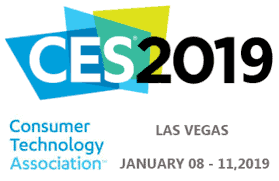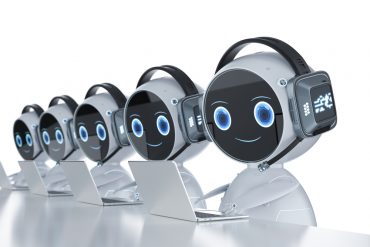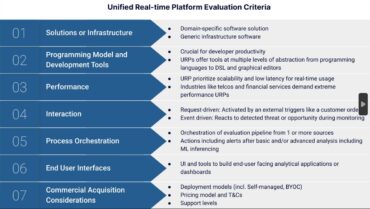
It’s not just about consumers anymore. Here are some trends to keep an eye on at CES 2019.
The Consumer Technology Association’s huge annual tradeshow extravaganza, Consumer Electronics Show (CES) is upon us. Officially starting today and running for the rest of the week in Las Vegas, 150,000+ attendees will gather to check out the latest in consumer tech innovation.
But increasingly, with the advent of IoT, cloud computing capacity and AI in everything, the “C” in CES — the consumer — in the tech on display is less at the forefront. It’s no longer just about the next TV, smartphone, or wearable. It’s about the backbone of the entire “big data” universe that enables inevitably connecting all of this new tech, analyzing the data it provides, and generating insights on what you, as a consumer, may do next.
Here are the trends we’re seeing at this week’s CES:
1. The effect of the “platform” companies. Historically, attendees went to CES to see the biggest consumer electronics companies in the world. Now, the companies driving the most significant shifts in the consumer technology landscape – Alibaba, Apple, Amazon, Baidu, Google, Facebook, Microsoft, and Tencent – have a limited formal presence, and yet their effect on the show is undeniable.
As creators of dominant hardware, cloud, OS, and AI “platforms” the products these companies make are a major aspect of every digitally-enabled product or service. Two years ago, none of these companies were formally showing at CES, yet Amazon “won” CES 2017 with Alexa integrations in every device category imaginable. Last year, Amazon and Google had a formal presence, with the latter making a massive statement through an unprecedented media blitz. These platform companies will continue to have an effect on CES 2019 and beyond.
2. CES is not just consumer tech anymore. The show has grown – not just in the number of attendees, but in the variety of industries. In fact, USA Today named CES one of the 10 Best Auto Shows and this year it will feature more than 150 vehicle tech companies, including eight automakers. A new Tourism Marketplace will also debut this year with a focus on the technology customizing and advancing travel. CPGs are also making their presence felt – with P&G hosting a startup pitch competition – while other CPGs look at the effect of tech on the supply chain.
Additionally, CES continues to grow as a marketing event, with the C Space merging with the Sports Zone to create a “conference within a conference” for content producers, marketers, and distributors. Organizers are projecting C Space attendance will double the 22,000 attendees from 2018 and with Cannes only drawing around 15,000, CES may become the largest ad event of the year.
3. Seamlessly integrated consumer technology. Consumer products increasingly leverage advancements in software and hardware tech, including voice integration. While Amazon and Google showcased more foreseeable voice applications over the last two years, this year we expect to see companies push voice to products in more meaningful ways. In 2019, foldable screens will go from a novelty to a real product with Samsung leading the way in phones and tablets.
Other applications include a 360-flexible display around a wrist, redefining the “watch,” and, similarly, we’ll see flexible screens embedded in clothing. Yet, it’s hard to imagine tech being “seamlessly integrated” with wires sticking out of every device. While wi-fi keeps us connected, power has been more of a challenge. We expect announcements enabling easier charging of mobile devices – and expansion into other categories – with Honda releasing wireless charging for autos.
4. VR to scale, and AR to keep us wondering. 2018 was Virtual Reality’s (VR) biggest year yet with more devices and more revenue. SONY PS VR and Oculus Go led the way with the latter selling for an affordable $200. Resident Evil 7 VR on PS4 is legitimately terrifying. We are VR optimists in 2019 because we’ve finally seen worthwhile products sell at scale in market, and VR hardware invention has now moved from “can do” to “do well.”
In fact, Verifocal tech already won a CES 2019 innovation award, alleviating headaches, eye strain, and nausea caused by VR. This, combined with Oculus Quest and a rumored update to Rift, makes 2019 a potential standout year. As for Augmented Reality (AR), it will surpass VR in importance and scale, but we’re still nowhere near meaningful consumer applications outside of Android and iOS phones. We will see demos, but nothing will be in peoples’ hands this year.
5. (Talk of) AI is ubiquitous. Every major exhibitor last year touted their AI, focusing on personalization and better performance. The reality was that this was mostly automation, not meaningful AI. However, platform players have all improved their AI offerings and we expect voice assistants to benefit the most. Titans and startups alike will showcase AI advances, such as Samsung’s C-Lab, which will introduce eight new AI projects in Eureka Park at CES 2019. This suggests future products in addition to announcements across their main product lines.
6. Privacy and security in the IoT. Critics warned connected hardware would open up privacy and security issues, but hardware manufacturers with little security experience threw mobile chips into just about anything. From the 2016 distributed denial of service Mirai botnet attack that left much of the internet inaccessible on the East Coast to the Nest Camera hacks last month that had parents worried about their children’s safety, it is clear we need to focus on security. CES ramped up content on building secure devices and awarded Scaylys a CES 2019 Innovation Award for their TrustBox router. We’ll see cool IoT products at CES 2019 – just remember to ask the hard questions about how they are secured.
7. Startups (and personal health) more important than ever. Eureka Park continues to be my favorite part of CES. While the main halls feature well funded, well rehearsed (and over the top) showcases, Eureka Park offers a simpler and more rewarding exploration. It covers many of the trends above with a diversity of niche applications that provide potential for real value, specifically in the personal health area. Just a few years ago, Eureka Park allowed close observers to predict the massive wave of those devices we now see as part of the main show.
8. 5G for real. It’s for really real this time! The telecom hardware industry has been pining for 5G to justify a full-scale upgrade of everything. While we’ve had demos at CES for the past few years and a few towers in Seoul, 2019 will be the first year of 5G in market with every major U.S. telecom. At CES, we hope a major focus will be taking the conceptual advantages of 5G beyond speed and bandwidth to real product performance advantages.
9. Electricity! – Who needs electricity for consumer electronics? We predict the crazy, new innovation of functioning electricity at the show. Never forget #CESBlackout2018!




























